Public diplomacy and communications
Programs 1.1, 1.3 and 1.9
 Not Met
Not Met  Partially Met
Partially Met  Met
Met
|
|
2013–14 |
2014–15 |
|
Australia’s foreign, trade and economic, development and international security policy interests and international standing are advanced through: |
||
|
|
|
|
Promotion of people-to-people links and a contemporary and positive image of Australia as a destination for business, investment, tourism and study and support for the government’s international policy goals, including through grants and other support to bilateral foundations, councils, institutes, alumni and diaspora community engagement and leadership dialogue.1 |
|
|
|
To assist developing countries by contributing to reducing poverty and lifting living standards through sustainable economic growth. |
|
|
|
|
2013–14 |
2014–15 |
|
The department’s advocacy, negotiation and liaison on Australia’s foreign, trade and economic, development and international security interests contributes positively to bilateral, regional and multilateral outcomes that help ensure the security and prosperity of Australia and Australians. |
|
|
|
An understanding of contemporary Australia and the government’s foreign, trade, investment and development credentials, and strengthened people-to-people and institutional links and trade, economic and cultural ties.2 |
|
|
|
Achievement of significant development results. |
|
|
1 Deliverables for 2013–14 did not include support to alumni and diaspora community engagement and leadership dialogue.
2 KPI for 2013–14 did not reference investment and development credentials, institutional links or cultural ties.
Overview
The department’s public diplomacy strategies promoted Australia’s economic, artistic and cultural, sporting, scientific and education assets. Through our projects, we promoted Australia as a modern, tolerant, dynamic and successful country and an attractive destination for tourism, investment and study.
We strengthened people-to-people and institutional links through the Australia Awards Scholarship program which continues to build a network of leaders and advocates for Australia through study in Australia under the aid program.
We deepened the department’s digital presence by launching a revamped website and increasing our social media presence. We embraced the challenge of new technologies opening up unprecedented opportunities to reach and engage with different audiences.
Our active engagement with media, domestically and overseas, contributed to informed coverage of Australia’s policies and programs as well as effective crisis communications during humanitarian and consular events.
Cultural diplomacy
The department’s cultural diplomacy programs build awareness of Australia’s society and values, strengthen links between Australian artists and arts organisations and their international partners, and expand audiences and markets for Australian artistic work and creative products.
We delivered cultural activities through 91 posts in support of the department’s public diplomacy strategy, with major initiatives in Indonesia, Singapore and Turkey.
Our embassy’s Arts and Cultural Program in Indonesia highlighted Australian excellence in the arts, science, innovation, literature and sport, delivering 61 events across 13 locations. The program engaged influential stakeholders and artists, generating strong corporate sponsorship and attracting large local crowds.
Our focus country for 2015 is Turkey. The year-long program, run in parallel with broader Anzac Centenary commemorations, has so far featured activities in Ankara and Istanbul that have highlighted Australia’s creativity and innovation.
In May 2015, our high commission in Singapore curated ‘50 Bridges’, a highly successful program of street art and performance to mark the 50th anniversary of Australia–Singapore diplomatic relations and the 50th anniversary of Singapore’s independence.
In partnership with Screen Australia, the department supported initiatives that delivered opportunities for Australian screen industry practitioners to participate in festivals and markets. We also supported activities in 13 posts to promote Australian screen content and culture through film. We funded 15 projects designed to raise the profile of Aboriginal and Torres Strait Islander art and culture internationally.
The Australia International Cultural Council (AICC) grants program supported 16 projects in Asia, the Americas and Europe. Highlights included the Tasmania–Indonesia Dance Exchange project in West Sumatra, Australian Dance Theatre’s tour of the contemporary dance production ‘G’ in Latin America and Belvoir’s acclaimed tour of ‘Wild Duck’ in London and Paris. In the 2014–15 Mid-Year Economic Fiscal Outlook, the Government announced the abolition of the AICC. The Australian Cultural Diplomacy Grants Program will replace the AICC grants and deliver its first round of funding in 2015–16.
We have taken steps to promote Australian fashion internationally, beginning with the development of an MOU between the department and the Australian Fashion Chamber.
Sports diplomacy
A key achievement was the launch of the Australian Sports Diplomacy Strategy 2015–18. The strategy—developed with Austrade, the Office for Sport, Tourism Australia and the Australian Sports Commission—focuses on four goals:
- Connecting people and institutions through sport;
- Enhancing sport for development;
- Showcasing Australian capability through sports; and
- Supporting innovation and integrity through sport.
The department capitalised on Australia’s hosting of the AFC Asian Cup and the ICC Cricket World Cup 2015 by supporting programs in the lead up to and during the tournaments to promote Australia’s foreign, trade and development policies.
We delivered international sport for development programs under the Australian Sports Outreach Program. Our Pacific Sports Partnership program supported 11 Australian national sporting organisations in eight Pacific countries to undertake development work. The program supported collaboration between Australian national sports organisations and their Pacific counterparts to encourage regional leadership on issues such as social inclusion, health, governance and education.

Trade advocacy
The department used new media, including social media and interactive websites, to better communicate Australia’s trade policies. We expanded the readership of our weekly trade newsletter, Trade Talk, and launched a new bi-monthly online publication, Business Envoy, to better connect with business.
Demand for the annual Trade at a Glance pocket booklet remained strong. We promoted the conclusion and signature of the China–Australia Free Trade Agreement, generating public interaction with our tweets and new visitors accessing promotional material on the department’s website.
Visit programs
The department managed three major visit programs that promoted people-to-people links and improved understanding of Australia and the Government’s foreign, trade and development policies.
International Media Visits
During the year, our International Media Visits (IMVs) program promoted Australia’s presidency of the G20, Australia’s trade relationships with India, China and MIKTA countries, raised understanding of management of the Great Barrier Reef and promoted Australia’s sports and major events capabilities. We funded and organised seven IMVs to Australia, comprising 55 journalists from 21 countries.
Through an internship program with the ABC, three journalists from the Indo–Pacific region came to Australia to develop their journalism skills. The department also supported the annual Elizabeth O’Neill Journalism Award—created in memory of a departmental officer who died in the Yogyakarta plane crash in 2007—with a two-week exchange between Indonesian and Australian journalists.
Special Visits Program
Our Special Visits Program (SVP) brought 39 decision-makers and emerging leaders to Australia. The program exposed visitors to a range of policy issues, from economic diplomacy and women’s empowerment to regional security and innovation in agriculture and the extractive industries.
International Cultural Visits Program
In partnership with the Australia Council for the Arts, we supported a delegation representing China, Malaysia, Japan, Republic of Korea and Thailand to attend the 2014 Electronic Music Conference in Sydney. The week-long program gave the delegates exposure to emerging Australian electronic dance music talent and created opportunities for Australian artists to tour in Asia.
In partnership with the Australia Council for the Arts, Artspace and the Contemporary Arts Organisations network, we supported four Turkish art curators to visit Australia in October 2014. The program included tours of Australia’s key art institutions and peer meetings with curators, academics and artists. The visit allows for future collaboration between Australian and Turkish institutions.
Australia Awards and alumni
The Australia Awards are a whole-of-government initiative bringing together scholarships and fellowships offered by the department, the Department of Education and Training, and the Australian Centre for International Agricultural Research. Awards administered by the department are a key pillar of the aid program because of the lasting social and economic benefits they bring to our developing country partners. The awards help Australia build an alumni network of leaders and strengthen people-to-people links in the Indo–Pacific region.
In 2014–15, the department’s Australia Awards expenditure was $372.2 million. We offered 4322 new awards (fellowship beneficiaries, scholarships and short courses) to recipients from 80 eligible developing countries—approximately 72 per cent from the Indo–Pacific region.
We built domestic and international awareness of the Australia Awards brand through enhanced social media activity on Twitter and YouTube (see video) and we distributed a style guide for better global intake advertising. We also increased our engagement on the awards with institution partners at the policy and operational level, including through the establishment of the Institution Consultative Forum and institution roadshows.
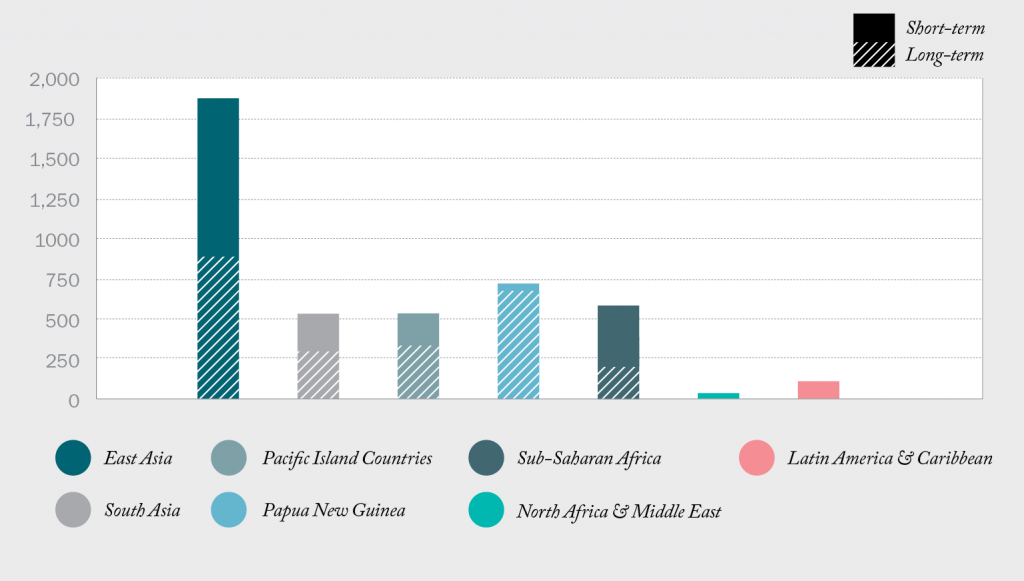
In 2014–15, the department offered 2381 scholarships and managed a total of 8367 long-term awards across 80 tertiary institutions, with 2553 students successfully completing their studies. Over 54 per cent of the Australia Awards Scholarships were awarded to women.
We provided 46 Australian host organisations with funding for 111 Australian Award Fellowships, benefitting 1441 Fellows (742 females and 699 males) from 67 countries.
The Fellowships are administered by the department to build capacity and skills in priority foreign affairs and development sectors. They provide mid-career professionals with opportunities for short-term research, study, and professional development experiences, and build links between organisations in Australia and their partner organisations in developing countries.
We strengthened connections with alumni through networking events, mentoring programs, alumni excellence awards and professional development workshops and conferences. These activities support alumni communities to remain active and relevant to our departmental priorities.
The department commenced development of an Australian global alumni engagement strategy designed to include graduates outside the Australia Awards program. We plan to launch the strategy in the next year.

Foundations, Councils and Institutes
The department supported secretariats for nine foundations, councils and institutes (FCIs). Funding was provided through the International Relations Grant Program. A total of 227 FCI grants were allocated, with a focus on economic, sport and science diplomacy as well as the promotion of education, media and the arts.
Australia–China Council
The Australia–China Council’s (ACC) 2014–18 Strategic Plan seeks to strengthen the Australia–China partnership through focusing on three key priorities—education, economic diplomacy, and arts and culture.
The ACC supported projects in economic diplomacy, education and the arts, as well as Australian Studies Centres throughout China. The Foreign Minister launched the ACC-funded Australia China Trade Report in March.
The ACC supported arts and cultural exchanges including a regional tour by the Sydney Symphony Orchestra, and a major exhibition of Emperor Qianlong’s collections by the National Gallery of Victoria.
The ACC Chair participated in the inaugural High-Level Dialogue in Beijing. The ACC also held its inaugural Australia–China Achievement Awards in November 2014 to coincide with the State Visit by Chinese President Xi Jinping.
Australia–India Council
The Australia–India Council’s (AIC’s) speakers’ exchange program was focused on the promotion of Australia as a business and investment destination. Kiran Mazumdar-Shaw, the CEO of India’s largest biotech company Biocon, visited Australia and addressed large business audiences in three capital cities on opportunities for Australia–India partnership in the biotech industry. A member of the Infrastructure Australia Board visited India to promote Australia’s expertise in infrastructure funding design and opportunities for investment in Australia’s infrastructure project pipeline.
The AIC promoted Australian artists and authors in India supporting a multi-city speaking tour of award-winning author Christos Tsiolkas and sponsoring the participation of contemporary Indigenous artist Daniel Boyd at India’s largest visual arts festival, the Kochi-Muziris Biennale.
The AIC introduced an Australia–India Media Exchange Program which achieved strong coverage of the bilateral relationship in major newspapers and through social media.
Australia–Indonesia Institute
The Australia–Indonesia Institute (AII) advanced Australia’s foreign, trade and development policy priorities through support for community and institutional linkages. Five new board members were appointed, bringing science, education and business expertise to the board.
The AII supported the Government’s economic diplomacy agenda with a targeted media visit of four leading Australian economics journalists to see infrastructure opportunities and challenges in Indonesia and Australia–Indonesia trade success stories. The AII continued to support the BRIDGE school partnerships program, which links 132 schools, Australian and Indonesian teachers and many thousands of students and their families and communities.
In line with its mission to promote people-to-people links through personal contact and exchange of technical knowledge, the AII also supported a Northern Territory government training program for emergency services personnel from Nusa Tenggara Barat.

Australia–Japan Foundation
The Australia–Japan Foundation (AJF) co-sponsored the official lunch for Prime Minister Shinzō Abe in July 2014, at which it announced the establishment of a Rio Tinto Chair of Australia–Japan Studies at the University of Tokyo.
AJF grants promoted economic, science and sports diplomacy in Japan. Economic diplomacy initiatives included the Australian National University’s Japan Update 2014 Conference featuring leading Australian and Japanese political economists, and the launch and promotion in Japan of the Australia–Japan business matching website to increase trade opportunities.
Science diplomacy highlights included an exchange visit by Australian science teachers to Japanese high schools, a visit by mid-career Japanese scientists to Australia under the leadership of the Australian Academy of Technological Sciences and Engineering, and a CSIRO-scientist visit to high schools in Tokyo and the Tohoku area for scientific outreach activities.
Australia–Korea Foundation
The Australia–Korea Foundation (AKF) supported a mid-career journalist exchange program focused on the Korea–Australia Free Trade Agreement and media internships for Australian students. The AKF also supported a tailored exchange program undertaken by emerging research leaders from the Australian Academy of Technological Sciences and Engineering and Korea’s National Research Foundation.
An AKF grant brought together Korean language stakeholders to identify strategies to increase the numbers of students following the introduction of Australia’s national Korean language curriculum. The AKF supported the Centre for Australian Studies, Yonsei University, resulting in the first accredited Australian Studies courses.
Australian Photography Now showcased contemporary Australian photography to over 40,000 visitors in an exhibition at the 13th Dong Gang International Photo Festival. The premiere of The Tale of Samulnori in Seoul and Sydney received very positive feedback. A documentary of three Korean soccer fans in Australia is in the final editing stages.
Australia–Malaysia Institute
The Australia–Malaysia Institute (AMI) celebrated its 10th year of supporting people-to-people links between Australia and Malaysia.
The AMI’s flagship exchange programs enhanced understanding of Australia’s democratic institutions and reinforced connections and commonalities between emerging Australian and Malaysian leaders. The AMI’s Muslim Exchange and the Young Political Leaders’ Programs provide participants an opportunity to share views and experiences of multicultural and interfaith practice, democracy and electoral practices. The AMI established the Australia–Malaysia BRIDGE school twinning program to build partnerships between eight Malaysian and Australian schools.

Australia–Thailand Institute
The Australia–Thailand Institute (ATI) focused on strengthening business and education ties with a conference to mark the 10th anniversary of the Thailand–Australia Free Trade Agreement. The BRIDGE program funded eight new partnerships between Thai and Australian schools and extended eight existing BRIDGE schools to develop innovative projects for teachers and students in science, music, mathematics and sports. The ATI supported the design of teacher-focused software to help autistic and other special needs students through BRIDGE.
The annual visits program for next generation community leaders included meetings with Islamic, Hindu, Buddhist and Christian communities in the diverse outer suburbs of Melbourne.
Council for Australian–Arab Relations
The Council for Australian–Arab Relations (CAAR) launched three programs to enhance people-to-people links and build more contemporary views of Australia in the region and vice versa. These include an International Speakers Program to support the two-way flow of influential individuals for a week of public speaking and media opportunities; a Visiting Fellows program which assists Arab academics to research, teach and learn in Australia for up to 12 weeks; and a Media Interns program which funds Australian journalism students to visit and intern at news agencies in the Arab world. CAAR continued its support for the annual Arab Film Festival Australia.
CAAR used the strong Arab presence in the AFC Asian Football Cup to sponsor a series of community and business events in Melbourne and Sydney in the lead up to the event.
Council on Australia Latin America Relations (COALAR)
COALAR expanded education links with Latin America through support for the University of Adelaide’s Latin America Symposium in February 2015. COALAR supported TAFE Directors Australia to run a series of seminars on Australia’s vocational, education and training model in Latin America. COALAR also supported the Australia Latin America Business Council (ALABC) annual networking day in Canberra.
A COALAR member visited South America, in March 2015, to advance education links through meetings with education authorities in Argentina, Brazil, Chile, Ecuador, Colombia, Peru and Mexico.
In Colombia and Brazil COALAR funded the Energy–Water–Food Nexus seminars, attended by the Trade and Investment Minister in Rio de Janeiro, at which he advanced Australia’s links and expertise in water management.
Other activities included the Surfing Scholarships for Disadvantaged Young Peruvian Surfers, which the Foreign Minister announced during her visit to Lima in December.
Website and social media
Throughout the year, the department continued to deliver high quality information to the public through its Australian and overseas mission websites. Our website (dfat.gov.au) received 5.6 million visitors and 19.5 million pageviews. Most visitors were from Australia (2.9 million) with 34 per cent of traffic to the site coming from overseas.
Nearly 100 websites across the department’s global network reached 9.1 million users and had 36.9 million pageviews. Beijing was the most visited overseas mission website with more than 937,000 visitors and 7 million pageviews. Thirty-nine overseas missions published in local language.
To meet the needs of our online audience, we invested in redevelopments of the department’s intranet (July 2014) and website (January 2015). Overseas mission websites are scheduled for redevelopment in 2015–16.
Our use of social media continued to expand. At 30 June 2015, we had 112 social media accounts in 68 countries, an increase of 53 per cent over last year. The range of platforms was also expanded to include LinkedIn, WeChat and an official blog by the Ambassador to Germany.
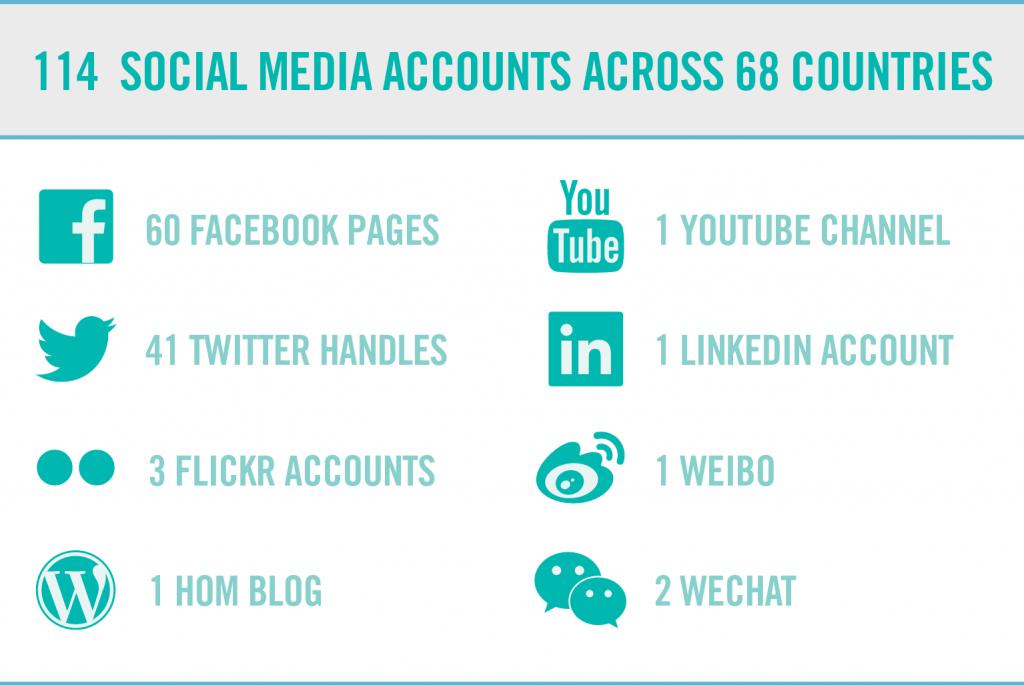
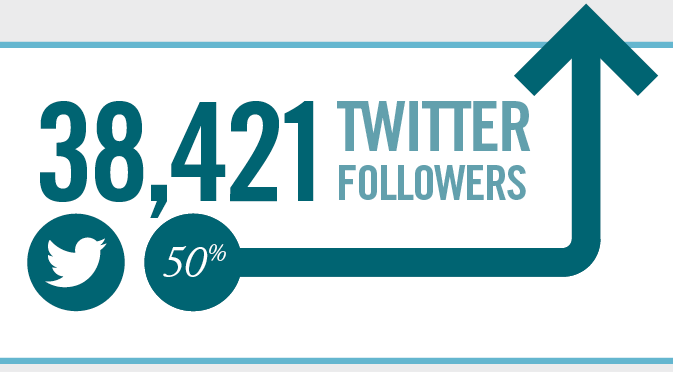
The department used social media innovatively across the network. For example, our embassy in Buenos Aires hosted a successful Facebook Q&A session for the Ambassador for Women and Girls and the embassy in Beijing hosted a live chat with the ambassador on Weibo. Targeted online engagement around Australia’s hosting of the AFC Asian Football Cup and the ICC Cricket World Cup 2015 generated widespread public engagement with 20 tweets reaching more than one million people.
We also promoted trade data in engaging infographics on social media. The number of followers of the departmental Twitter account (@dfat) continued to increase during the year to 38,421, making it the fourth most followed Australian government account.
The department has expanded and enhanced its multimedia presence with 211 public videos. We have 6489 images publicly available through the department’s website.
Media and communications
The department’s media liaison team in Canberra managed close to 5000 queries from domestic and international media organisations, up from over 4000 last year. Several hundred foreign media queries were responded to by Australian missions overseas.
Consular matters generated significant media interest, as did the department’s support for Australians affected by major incidents overseas, such as the downing of flight MH17. We encouraged media outlets to include messages on safe travel in their reporting on these matters.

In challenging environments, the department provided on-the-ground assistance to Australian media covering the Government’s humanitarian response to natural disasters overseas, such as Tropical Cyclone Pam in Vanuatu and the earthquakes in Nepal.
We managed media arrangements for high-level visits, including the Prime Minister’s attendance at the Anzac Centenary in Turkey, and the bilateral visit of the Prime Minister and Trade and Investment Minister to India. We also managed media for the Foreign Minister’s visit to New York, Ukraine and the Netherlands following MH17.
We prepared over 360 media releases and public statements for the department, portfolio ministers and parliamentary secretaries.
The department’s strategic communications effort supported key foreign, trade and development policy initiatives. These included Australia’s year as G20 host, the China–Australia Free Trade Agreement and the Great Barrier Reef Taskforce, as well as the launch of the innovationXchange, the Strategic Framework 2015–19 and Values Statement and the new disability-inclusive development strategy, Development for All 2015–2020.
An innovative approach to public diplomacy communications in 2014 was the department’s cooperation with Embassy Productions on a four-part observational documentary series set in Australia’s embassy in Bangkok. Aired on Channel 9 in October and November, The Embassy was often the most watched program in its timeslot and reached at least one million viewers per episode.
The department’s internal communications focused on supporting the Secretary and executive on the post-integration agenda. We encouraged awareness of the department’s policies and provided training on media engagement and the use of social media to improve skills and capabilities in these areas across the integrated department.
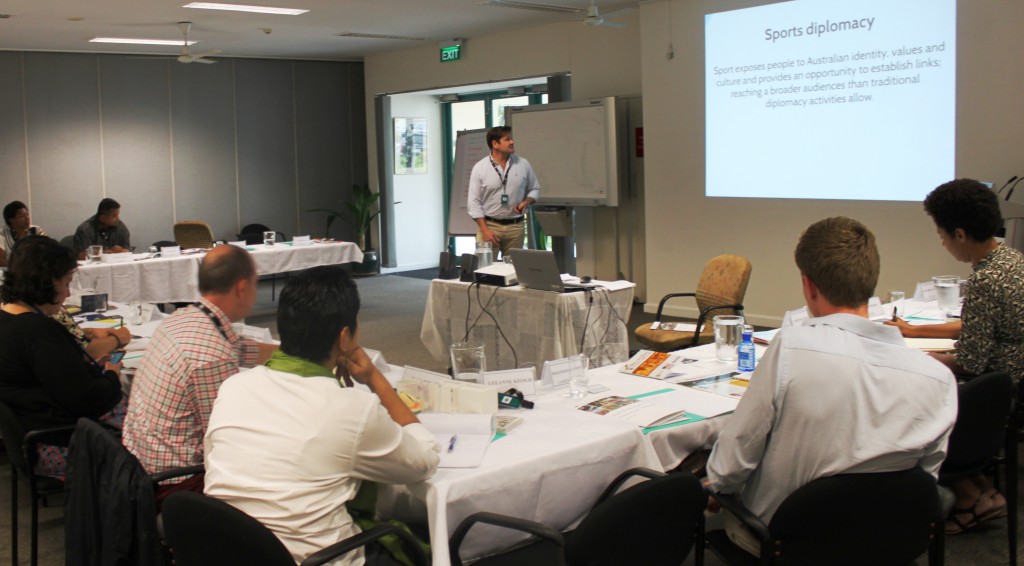
Publications
In 2014–15 the department updated its key public diplomacy publication, Australia in Brief. The 50th edition provides an authoritative overview of Australia’s history, the land, its people and their way of life. It also looks at Australia’s economic, scientific and cultural achievements and its foreign, trade, development and defence policies. The publication was distributed to all overseas missions and is a popular public diplomacy tool, particularly for school students. It has so far been translated into six languages. An e-book version is also available on Apple iBooks and Google Play.
More than 180 publications were added to the DFAT website and are available to download from dfat.gov.au/publications.
Historical publications and research

The department maintained its commitment to research and publication on the history of Australia’s external relations.
Work continued on volumes in the Documents on Australian Foreign Policy series, including Australia and Southern Rhodesia/Zimbabwe, 1950–1980; Australia and the Western Pacific, 1950–1980; Australia in the interwar Period, 1920–1936; Australia in War and Peace, 1914–1919; and Australia and Resources Diplomacy, 1960–1980. The department is continuing the program to digitise 28 previously published volumes of historical documents, scheduled to be completed in 2015–16.
The department continued to collaborate with the Australian National University, the University of Melbourne and the Crawford Fund on a biographical study of Sir John Crawford and with the University of Tasmania on a history of Australia and the OECD, the latter due for publication in 2015–16.
To assist policy officers from the department and other agencies to gain deeper historical insights into Australian policymaking, the department held a seminar series, ‘Historical Perspectives on Contemporary Policy Challenges’, featuring presentations by leading academics and practitioners of diplomacy.
A social media campaign was launched on Twitter, using the #OnThisDay and #DFAThistory Twitter handles to disseminate historical images and draw public attention to Australia’s more than one hundred years of international engagement.
Australia Network
In the 2014–15 Budget, the Government ended the Australia Network contract with the ABC. The Australia Network ceased operating on 28 September 2014.
Treaties
The department maintained the Australian Treaties Database, an online public resource for researching treaties to which Australia is a signatory or party. The database can be accessed at dfat.gov.au/treaties. We also maintained the Australian Treaties Library, which makes available the texts of all treaties Australia has entered into, and conducted treaty training for Commonwealth and state officials.
Sanctions
The department maintained the Consolidated List, an online public list of all persons and entities who are subject to targeted financial sanctions or travel bans under Australian sanctions laws. The list can be accessed at dfat.gov.au/sanctions.
|
* Additional information provided for the 2013–14 reporting period. |
|||
|
2012–13 |
2013–14 |
2014–15 |
|
|---|---|---|---|
|
Number of records examined |
971 |
1,015 |
1,056 |
|
Number of folios contained in these records |
196,171 |
231,597 |
202,306 |
|
Number of records released through the ‘fast track’ process* |
– |
159 |
744 |
|
Records subject to review or legal appeal* |
– |
34 |
38 |
Archival examination
During the year the department continued to develop efficient processes for providing advice to the National Archives of Australia on the release of Commonwealth records subject to access requests under section 40 of the Archives Act 1983.
Additional resources were allocated to meet a 39 per cent increase in public demand for departmental files and the legislated transition of the closed access period from 30 to 20 years.
An ongoing partnership with the National Archives of Australia helped to improve referral and examination processes. We also worked to streamline examination methods and adopt a more efficient referral system.
Freedom of information
The department finalised 334 freedom of information (FOI) applications in 2014–15 —a 25 per cent increase since 2013–14.
Detailed information on the department’s management of FOI requests can be found on the Office of the Australian Information Commissioner’s website at oaic.gov.au/freedom-of-information/
We continued to publish information under the Information Publication Scheme contained in Part II of the FOI Act. The content is available at dfat.gov.au/foi/ips.html
Library
The HV Evatt Library continued to support departmental officers by providing research and reference services and enabling access to a collection of over 40,000 items, including over 2000 online resources, specialising in foreign relations, trade, aid and development.
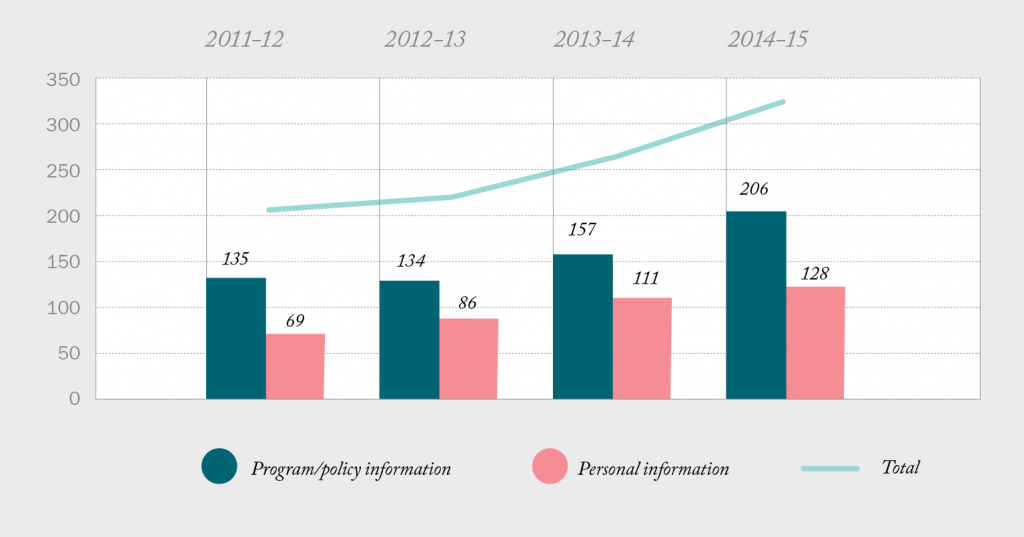
Outlook
The department will support activities that promote Australia’s national interests, economic diplomacy agenda and people-to-people links in culture, sport, innovation and science. We will emphasise Australia’s engagement with the Indo–Pacific region and build understanding of the Government’s development agenda including the innovationXchange and promoting the economic empowerment of women and girls.
The department will develop an evaluation framework to guide the monitoring and evaluation of public diplomacy activities and improve the design and delivery of our programs.
Our cultural diplomacy will build links in key Indo–Pacific markets as well as focus on Australian science, design and fashion. The 2016 Focus Country Program will be Brazil and will demonstrate the sophistication, energy and diversity of contemporary Australian culture.
We will develop a digital media strategy to support the department’s expanding social media presence and to build our digital capabilities.

